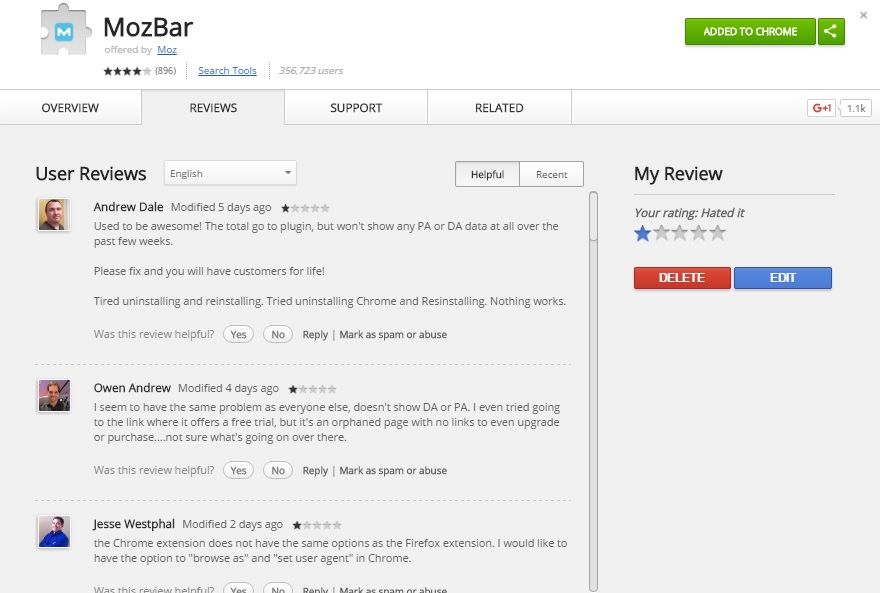The 5 Problems With 3rd Party SEO Metrics
In the SEO industry, you’ll hear about all sorts of crazy new metrics and how these metrics supposedly represent your SEO efforts. You have DA and PA, TF and CF. Your TF cant be higher than your CF unless you’re a spammer and a 30+ DA is a sign of a quality site. Then swoops in BL raising your UR, but not as much as your DR. Whangdoodles, Hornswogglers, Snozzwangers; after a while, hearing these metrics makes you just feel like you’re listening to Willy Wonka talk about Loompaland. But just what do these metrics have to do with Google?
Nothing. Nothing at all.
You see, contrary to popular belief, none of these SEO metrics have anything to do with Google outside of trying their best to estimate a site’s ranking power; Majestic, Moz, and Ahrefs are simply 3rd party metrics filling what some SEOs would call a “void”. For those of you who didn’t know, at one point in time Google had a metric called PageRank, which is no longer publicly updated, but still exists. Unlike PageRank, these other metrics are not affiliated with “The Big G”. However, a surprising number of SEOs don’t know this, and I’ve seen people on more than one occasion actually believe that Moz, Majestic, and Ahref are subsidiaries of Google. This is a problem in and of itself, but what they don’t know is that this issue is only the tip of the iceberg, and it’s about to get a whole lot deeper!
The 5 Problems With 3rd Party SEO Metrics
Problem #1: They Can Be “Easily” Manipulated
Josh MacDonald from JoshMadDonald.net created both a thread on the black hat SEO forum Black Hat World and a YouTube video (below) about the manipulation of domain metrics. Since he knows more about the manipulation of these metrics than I do, I’ve quoted him and embedded his video below.
I don’t use metrics because they can easily be skewed. It’s not hard to do and unless you have an Ahref membership to check every last link in the backlink report (which 98% of you don’t have), you will likely miss the metric skewing. On top of that, you have to know what you’re looking for. ~ Josh MacDonald
Problem #2: They Don’t Have The Resources Google Has
As I mentioned before, Moz, Majestic, Ahrefs, and all of those other metrics are 3rd party, so them not having Google’s resources are a given. However, something to note about this resource issue is that, at least in Moz’s case, this is a staff endorsed fact stated on Moz’s Q&A forum, and I’m glad a Moz staff member endorsed that answer because it let’s me know that they realise their limitations and aren’t trying to fool anyone into thinking they’re with Google. To quote the answer:
In short, Moz does not use Google’s data. Moz has a spider and Google has a spider. Moz’s spider isn’t as effective at finding links as Google – it’s mostly a horsepower issue. Some links get found much later, while other links never get found. Moz doesn’t have Google’s server resources. (Sorry, Rand). I’ve seen studies that show that any of the big 3 link research tools Moz, Ahrefs and Majestic only pick up 30-40% of a site’s backlinks.
This is not intended as a slap at any of the tools above. We subscribe to all 3 for various reasons, and we love them all.
Problem #3: URL Changes Can Skew Metrics
This was something strange I noticed with Moz and Majestic, although Ahrefs doesn’t have this issue. After I switched a few sites over to HTTPS, I noticed my DA on those sites went from roughly 25-35 to 10. In another case, I had an article that had a page authority of around 30 drop to 1 after I put all of my articles in a blog subfolder (the URLs were 301 redirected, of course). After checking out both Moz and Majestic’s site explorers, I noted that they only picked up on 1 or 2 backlinks, whereas before they found a good majority of the links I had.
On the other hand, Ahrefs was still able to pick up my links, so my Domain Rating (DR) was unchanged. I’m unsure of why Ahrefs is able to handle this problem when the other 2 can’t, although it’s because of this that I started using Ahrefs when I perform keyword research.
Problem #4: Broken Toolbars
This is more of a problem with Moz’s toolbar than the Ahrefs toolbar. Since around January of 2016, the Moz toolbar has been broken. Despite all of the complaints, Moz has yet to fix the ongoing issues surrounding its plugin including, but not limited to:
- Metrics not being displayed
- Graphical glitches
- The toolbar interfering with page elements on certain websites
- Issues surrounding logging in to use the metrics, only to discover that the toolbar doesn’t detect that you’re logged in.
If you don’t believe me, go read the negative reviews on Moz’s Chrome toolbar page.
Problem #5: Too many Marketers Rely Solely On These Metrics
There are marketers out there who think it’s perfectly acceptable to look solely at the Trust Flow (TF) and Citation Flow (CF) of a website and make their decision to buy links or even buy the domain just based on these metrics,a problem which Josh MacDonald also brought up. This leaves them open to being scammed or left wondering why that DA 40 site they just bought isn’t passing on any link equity (or “ranking power” in layman’s terms).
When it comes to SEO, there are search engine optimisers who make all of their keyword research and link building outreach decisions using the Moz and Majestic toolbars. While in the case of keyword research, this actually isn’t that problematic, people building backlinks by reaching out to other webmasters because the site has a high domain authority/trust flow may inevitably waste their time writing articles for a site that won’t benefit them in any way.
Conclusion
This point of this article wasn’t to say that these metrics are useless, but rather to point out the issue of over-reliance on these metrics in the SEO industry. Moz, Majestic, and Ahrefs’ metrics all have their uses. In fact, I personally use Ahrefs’ metrics while performing keyword research in order to give me an idea of what the competition is like in the search engine results pages (SERPs), something I’ve stated in my on-page SEO guide on Black Hat World. For Moz’s toolbar (when it does work), I use their page analysis tool as away to quickly gain some insight into a website.
- Slow Website? Consider Robots As Being The Culprit - June 24, 2025
- My Experience Accepting Crypto Payments For The First Time - April 25, 2025
- Are Forums Dying? A Look Into Forums As A Whole - April 22, 2025



Leave a Reply